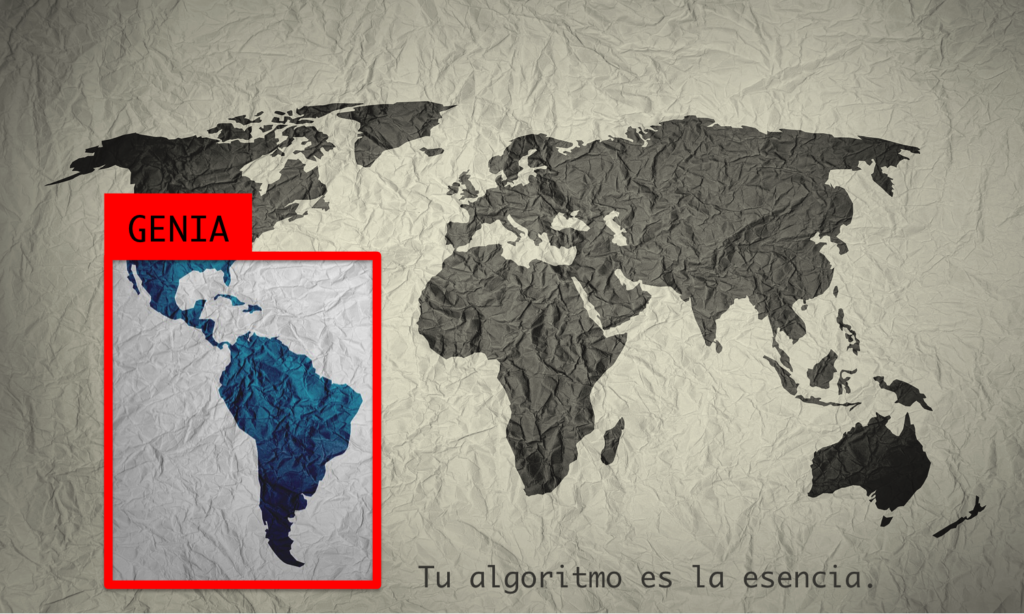
Jean García is a graduate of Political Science and Economics, with studies in Anthropology and Management. He is a fellow of the Singularity University, social and political activist, chairs the Center for Political Innovation in the Dominican Republic and is co-founder of GENIA Latin America. In the following dialogue, we will talk about his views on technology and its impact on our future, among other issues.
The COVID-19 pandemic comes as the deployment of 5G and IoT technologies begins, technologies that promise to continue accelerating the radical change that has taken place in the 21st century. What is your opinion about the role that the pandemic plays in history?
Without a doubt, the emergence of this new context derived from COVID-19 has accelerated our transformation towards ultra-connected and intelligent systems. What once seemed like science fiction, today we live in everyday life. The world changed. It no longer makes sense to say that “the world is changing”, or that “we must prepare for what is coming”. The disruption to the system has already arrived and we are seeing it raw.
In this way, we can say that the pandemic accelerated time, it has forced us to have the discussion that we all knew that sooner or later we were going to have: the current system is insufficient to respond to global emergency situations. This reflection is fundamentally linked to the issue of exponential technologies such as Artificial Intelligence (AI), the IoT, and the 5G infrastructure.
These technologies predict a greater disruption to the global system, which will impact all areas of society, generating greater uncertainty in crisis situations. These technologies have great potential to improve our systems, but they come with a series of risks – even of an existential nature – that we must collectively face on a global level.
The pandemic revealed the great deficiencies of the system, as well as accelerated processes that will bring greater difficulties to its capacity to successfully face the challenges of the Great Disruption.


The women’s liberation movement has empowered many women from all walks of life to denounce their transgressors, stalkers, rapists, etc … I recently heard about the launch of the book “Premka: White Bird in a Golden Cage: My Life with Yogi Bhajan ”In which a spiritual leader is accused of harassing and raping women who belonged to her community. To this we can add countless cases in which leaders in the course of history act against what is perceived as “good” or within the laws of morality. Taking into account that the society today is very likely more moral than in past centuries, what repercussions do you think this increase in accusations and movements will have? How do you think man would evolve in the face of his merely vicious behaviors from all these scandals, starting from the hypothesis of man’s “natural evilness”?
This is an interesting question because it starts from very complex premises. I do not completely agree with the hypothesis of the “natural malignancy of man”. I believe that the human responds to environments, rather than having a fundamental nature. For me the natural is what exists, I don’t think there is a metaphysical concept of nature; a fundamental essence. The natural encompasses the entire physical result and its universal derivatives, which are processes with a high level of randomness due to chaos and entropy. Although causal relationships are what science explains, the random component within complex systems is fundamental and breaks any concept of a “universal order” or pure essence of nature. Order is a concept that has evolved along with life, but Physics tells us that disorder and chaos are the greatest universal forces.
Good and bad are inter-subjective concepts, that is, they are created through social language. Morality responds to a historical context and a social environment. What used to be moral today may not be tomorrow. Today we see with moral repudiation the era of human slavery, while we torture and murder billions of animals for dietary and aesthetic purposes, which suffer the martyrdom of civilization. Similarly, today we are flooding our oceans with plastic, deforesting our jungles, and destroying ecosystems. Perhaps in more “primitive” times that would not have been acceptable, taking into consideration the moral orientations of peripheral communities to civilization.
Undoubtedly, I believe that there have been advances, especially in the role of women in society. However, this does not mean that this advance is also a conception that comes from an intersubjective interpretation. Absolute concepts are difficult to apply in the field of social complexity.
“For me the natural is what exists, I don’t think there is a metaphysical concept of nature; a fundamental essence.”

The emergence of Artificial Intelligence applications, the large capital investment in less expensive energy, and other market trends, could represent the reduction of the cost of living on the one hand, and on the other hand the obsolescence of human labor in many areas . Today’s society has flourished due to capitalism, and humans today “live to work.” Ideas such as the Universal Basic Salary represent a probable economic solution to these problems. From the perspective of Social Sciences, what do you think about a possible decrease in the enjoyment of life of these people who would not work and what solutions are there?
The issue of the possible obsolescence of human work due to the deployment of automated systems is one of the great challenges that we must face as a society in the coming years. The Universal Basic Income has emerged as one of the loudest proposals to handle market disruption by exponential technologies. Without a doubt it is a measure that deserves to be studied and experimented on a large scale.
The quality of life of the people depends a lot on the access to the fundamental services that a society has. Whether there will be a decline in the quality of life will depend fundamentally on whether there is a social structure that guarantees access to public goods and services. That is why politics is fundamental and should not be replaced by merely technical, much less business thinking. Regardless of whether in the future we have a job or not, I believe that the discussion should be centered on access to goods and services that are fundamental for the common good.
That is why the solution is political, since it is the tool that societies have to guarantee rights. Ironically, like morality, rights are intersubjective realities that we create through language. The ethical and moral discussion cannot be separated from rights, since there is no law as an objective reality and it is only a construction of language.
That is why politics is the highest expression of human agency, since it is concrete action that plays between power relations and social capacities. To define whether there will be a greater or lesser quality of life in a scenario where work is no longer essential to life, it will depend fundamentally on the political action we take to guarantee the rights that we value as fair to our human condition.

“That is why politics is the highest expression of human agency, since it is concrete action that plays between power relations and social capacities.”
Today we have heard figures like Ray Kurzweil talking about the possible immortality of man. Many spiritual beliefs speak about the finality of man’s existence as being immortal, or breaking the “cycle of reincarnation.” In a world in which humans control their mortality, and have access to virtually unlimited energies, how do you think humans will live? What psychological and spiritual changes would they have? What would be their purpose, and perhaps more importantly, are they psychologically prepared for this?
Kurzweil has been one of my great inspirations over time. His ideas have been decisive in expanding my horizon of the potential that life has to transcend and expand the universe. In fact, I wouldn’t be who I am today if it weren’t for Kurzweil’s ideas. My work at GENIA is a direct result of my experience at Singularity University, an institution founded by Ray Kurzweil, motivated by his vision of exponential development towards technological singularity.
When you speak of the “purpose of human existence” I think precisely of teleological questions, even touching on metaphysical concepts such as destiny. I am not very given to assuming metaphysical ideas as absolute truths of nature, but I understand the conceptual relationship between evolutionary trends and teleological doctrines, which speak about the “end” of things.
Evolutionary philosophy is marked in all areas of thought, from biology to political economy. It should be noted that thinkers like Marx had an evolutionary philosophy, which have broad similarities with theologians like the great Jesuit Pierre de Chardin, who spoke about an “Omega Point” or an end point.
My thinking has been heavily influenced by evolutionary philosophy. It could be said that the concept of the Singularity is a teleological concept, since it speaks about a future scenario where we are irreversibly heading, determined by the “Law of Accelerated Returns”, explained in Kurzweil’s mathematical projections. Not only Kurzweil, Marx himself spoke about a dynamic where the materialist dialectic was going to lead us towards a new social order where the laws of capitalism would collapse, being a kind of “economic singularity” that he called communism. Hence my admiration for post-capitalist thinkers like Jeremy Rifkin, ideologue of the “Third Industrial Revolution”, who also raised a concept of economic uniqueness.
This evolutionary dynamic for me is something material, not a metaphysical essence of “nature.” If there really are social meta-trends that are leading us towards a Singularity, it is the result of feedback loops that respond to random probabilities in the world of atoms and quartks.
The theme of singularity and the eventual appearance of “general artificial intelligence” and “Superintelligence” for me reflects the clear end of the humanist conception. Furthermore, I think it represents the end of the human itself in the medium and long term. Not seen in apocalyptic optics but seen as part of the evolution of life. Intelligence and the same power are passing from an organic substrate to a synthetic one, with many more creative capacities and power of being.
Capacities and power that culture currently grants to the gods, which we are nevertheless creating based on pure reason. It is the triumph of reason over Faith.
Faith tells you of an abstract and mythological God, while reason little by little generates those apparently divine capacities in concrete terms. Not a heaven or hell after death, but a new state of being here in the real world, with the potential to create the best of utopias or the worst of catastrophes.
However, ironically, this can also mean the vindication of faith. So much so that it has been warned about the existence of God, innumerable parables that reflect what we can savor today through human creation. Perhaps the religions have been warning about the arrival of the Singularity, the end of the human and the beginning of infinity. I see a lot of similarity between the apocalyptic narrative and the eventual arrival of the Singularity.
It is a new order of life that transcends our biological capacity. We are creating a next evolutionary stage, with its own agency and transcendental potency in relation to our capacity. A very interesting phrase from Kurzweil when asked about the existence of God is:
“Does God exist? … Not yet.”
Tell us a little about GENIA. What are the main points of this strategy and how does the Latin American continent benefit from it?
We deploy the infrastructure to create the Latin American ecosystem of intelligent transformation.
The trunk of GENIA is the Inter-American Network of Artificial Intelligence Laboratories #YoSoyFuturo; that positions the region as a developer, not simply a user to grant agency to LATAM in the new digital era.
The ecosystem is based on these 4 pillars:
Data
Academy
Business
Public politics
Through a regional AI strategy, GENIA works on these 4 pillars to promote the creation of the first ecosystem of of artificial intelligence in the region.

